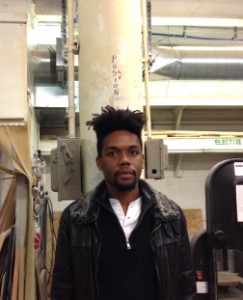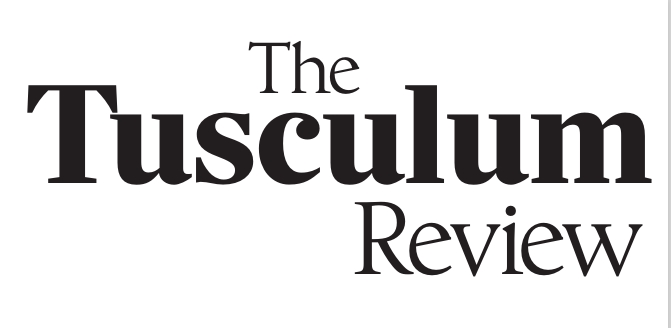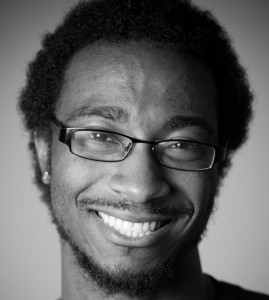ACCOUNTABILITY, AUDACITY, & ACCESS:
A CONVERSATION WITH PHILLIP B. WILLIAMS
by Justin Phillip Reed
In my last semester as an undergrad, I traveled to Saint Louis, Missouri, to visit the Writing Program at Washington University, where I would soon pursue my MFA in poetry. By then, I had already had what I remember as a two-hour-long phone conversation with Phillip B. Williams, my host for the three-day visit who was a year above me in the program and who has since become one of my dearest friends and an invaluable mentor. We still talk for hours on the phone, sometimes for a quarter of a day. Unlike the usual contents of those hours, the following dialogue is safe for work—though not particularly “safe”—and regards his debut poetry collection, Thief in the Interior, which was released on Alice James Books in January and is available for purchase here.
♦ ♦ ♦
Justin Phillip Reed: I’m thankful to have seen many iterations of this manuscript on its way to becoming the item I hold in my hand. And one poem in Thief in the Interior that I’m glad has remained, that consistently transports me, is “Ignis Fatuus.” It comes early in the collection and, I think, for good reason: in this poem, a relationship is established between I, he, and you—speaker, subject, and (arguably) reader—in which, it turns out, no one can be trusted. This feels titular. Deceit had a simpler face: violet / all around, every hemisphere familiar until turned. Is the question of the culprit’s face, the thief’s print, reflective of your personal understanding of culpability? In a volume so meditative on violence and its forms, is it important to destabilize these positionings, the reader’s and your own?
Phillip B. Williams: I think to answer that question I have to consider what the title means to me and has begun to mean to me. Perhaps in many ways the thief is everyone involved in the reading of a book that states openly that someone untrustworthy has entered a space that, by its nature of being interior, is also intimate. The thief is the speaker of the poems who has taken liberties with history, politics, desire, selfhood, and the narratives of others in order to express how the self of the speaker is part of this dangerous world. By sharing these stories, this pain, the question is “Am I also committing some crime?” The subject is a thief in as much as the subject is infiltrating the space of the reader, moving all the furniture and kicking the pets. The subject is also haunting the speaker, stealing peace of mind, and this is not necessarily a bad thing. And the reader of course is possibly the biggest thief of them all, eavesdropping on the speaker’s trials at figuring out if there are moral arguments to the exploration of pain, if these moral arguments even matter. Everyone is to be held accountable for these stories. Everyone has the “sharpest parts” as a part of them.
JPR: Let’s marry these two points: the statement “Everyone is to be held accountable” and the phrase every hemisphere familiar until turned — This familiarity and willingness to breach I get from the speakers of your book; regardless of what might be the repercussions of their intrusion, there seems to be no place they cannot go, no grating texture on which they cannot lie down, whether in snow-choked gutters of inner cities, forests from lore, or inside the bodies of dead beasts. Your commitment to imagery, especially of place, drives me up the wall, but your speakers’ ability to belong everywhere and nowhere returns me to thoughts of queer anxiety—how the realm of selfhood is so fragmented along identity lines that one tends to be most at home within the borders themselves. Your speakers, I think, are in this traversal. Their restlessness is revealed in code-switching (e.g., “He Loved Him Madly”) and the shiftless forms throughout. It’s as if language and form are, too, being held accountable, though we know they are untrustworthy.
PBW: For me the inadequacy of language is the true culprit of this fluctuation between and within spaces/registers. I’m a fool for precision and in a book that is basically about uncovering the wounds to finally talk about them I wanted to be as precise as possible, especially since there is so much ground to (un)cover. Precision, then, requires access to everything possible in order to have the width of capability. Nothing could be withheld from me. So what you read as restlessness I read as ownership of all things, even that which is not wanted. But as though a garden left behind by a dead grandparent, the speakers tend to the flowers, remove all pests, water and fertilize the fruits, flowers, and vegetables. The forms are just an attempt to tend the garden’s unruly nature that is frequently too large for the forms, breaks them open and apart, turns them around and against themselves.
I wanted more than anything for this to be a book of images. I’m happy that you were overwhelmed by their presence.
JPR: You know I couldn’t help but think of Paris is Burning and “O-P-U-L-E-N-C-E! You. Own. Everything!”
Speaking of creating against inadequacy and how this urge leads to formal subversion, a lot of these poems are heavily in conversation with probably the most immediately needful and subversive art form: hip-hop. You’re as much in dialogue with Césaire, Duncan, and Jorie Graham as you are with Bone Thugs and Wu-Tang. Is the demand for ownership also at play in this kind of sampling? And how did Beyoncé end up in “Inheritance: Anthem”?
PBW: The inclusion of musicians in the book is more so me including the playlist of my life into the book. Music informs my poetry in such a way that to not mention a song at all would feel disingenuous. I was raised around Hip Hop. My older sister is ten years older than me so she is definitely a child of the genre and the movement. I heard all of those artists from her listening to them. Those that appear in “He Loved Him Madly” were from a playlist she made me of artists who rapped about living lives as drug dealers.
Beyoncé’s appearance in “Inheritance: Anthem” is another story. I included her lyric “I woke up like dis!” as a critique of our militaristic moment re: state sanctioned violence. So much of the conversation revolved around bodying Black people, meaning calling those who are still living “Black bodies,” as though that classification were honorable and not life-stealing. In my mind I wondered, “Well what does it mean to wake up everyday as a Black body instead of a Black person?” Beyoncé uses the statement as a moment to be proud, but I found it horrifying to have to wake up as something you never intended on being.
JPR: I’ve been struggling with the same anxiety about “Black bodies,” and likewise you and I have exchanged concerns with how it often seems to really be that bodying—the Black cadaver, literal and imagined—that drives these uprisings. As much as the last half of Thief in the Interior is preoccupied with a more sustained state-sanctioned violence—namely, the welfare of Black lives enduring economic, psychological, and spiritual violence—how have you reconciled your aversion to death-as-momentum with proliferative projects like “Inheritance” and “Witness”?
PBW: The idea that death can be momentum is a fallacy. It may be a kind of catalyst for a movement but death itself cannot be what constantly inspires fights for justice. I hope the poems you mentioned bring that to light. Death-as-momentum is fantastic for soundbites and clickbait articles, and even for those of us who claim the title activist and have no qualms with sharing videos of Black people being killed. My poems are not meant to act as a mechanism of convincing anyone of anything. I have no interest in showing someone the murder of Eric Garner and saying “See! Look!” as though Ida B. Wells-Barnett hadn’t told us this at the turn of the 20th century. This is old news and what I want to do is show that it is old news. Not new and certainly not ammunition to prove the worth of worthy people to those who are still diabolically unconvinced, or who are convinced and that is precisely why they are acting so cruelly.
JPR: The bodies in Thief in the Interior also belong to animals: the bull in “Black Witch Moth,” the coyote / fox in “Luminous, Whatever Honey,” the crow in “Apotheosis,” the wolf in “Birth of the Doppelgänger.” Quite like so many of the human bodies, each is a site of carnage. While I can’t decide if I experience less friction digesting these images than, say, those in “Sonnet with a Cut Wrist and Flies” (in which the subject is a boy), they are no less spectacular and just as lyrically transformed. Particularly, the speaker of “Black Witch Moth” invokes the comparison of bull and boy, both corpses decaying and the earth not full. What, for you, is happening in this juxtaposition of what we might call “natural” violence with the violence we do to ourselves and to others? Even the term juxtaposition feels inadequate here, as the border is so troubled in a few of these poems.
PBW: This is a tough question because I don’t know if I consciously think about how the two, the beast and the human (which is another kind of beast), relate in their deaths. I think that is the point of “Black Witch Moth,” to say that, regardless of how one is made dead that death is seen as the same to the earth itself, which will just break down the bodies and still have room for more. It comes so early in the book as a warning in a way: “Don’t think we are more important to this planet than animals whose deaths we frequently ignore. This is a book about death. Deal with it.” And I have it in my mind that the violence we do to ourselves as people is “natural.” That doesn’t make it acceptable, rather it tells us just how far we have to go to evolve toward real love.
JPR: How would you define “real love”? Without violence?
PBW: Violence seems to be inevitable. And maybe “real love” is naive? At the very least rape across the board needs to cease and people could stop attacking and killing queer people. It would be nice if the way we looked weren’t used as a reason to be hateful and therefore dangerous towards one another. So much of our behavior is beneath what many of us would consider animal. Poverty is a kind of violence that is unnecessary. We have the most creative ways of disposing of other people.
JPR: That brings me back to “Witness” and some of the most resonant lines in the sequence: Some believe only the already- / destroyed are safe. I try to appear broken in order / to appear unbreakable, not worth further breaking. You’re referring to a performance of damage, one I read as not unlike a flawed and familiar ideal of masculinity. Damage—the survival of it—often characterizes, in popular culture, the antihero. The man’s man, who tends to be solitary. I wonder what could be more damaging: this performance in the name of survival, or the loneliness it tends to effect?
PBW: I think what is more damaging is the death, or at least the violence one can suffer in lieu of the performance. Some people find pride in being themselves regardless of getting attacked, heckled, or denied rights meant for them. I’ve seen that pride, though, turn into homelessness, family members being targeted, disability post being attacked, illness, and death. It depends on who you are and what you think or know you have to lose. I don’t see a problem with either way of survival as I’ve seen them both succeed and fail miserably.
JPR: The sonnet crown in the book’s third section reads like a meditation on survival and the transformations it necessitates. In “No, Tell Him—” you write: Then getting over it had to be redone. Daily, / a door to step through. Daily the hostile enigma: / to enter, turn the knob though the knob will burn. As we’ve addressed, your speakers insist on entry, whatever the cost. But does writing these poems come at a cost to you? What did you risk in writing Thief in the Interior, and what did it mean for you to have finished?
PBW: I had more at risk by not writing Thief in the Interior than I did writing it. For years it was what kept me grounded and attentive. It gave me something to do during a time when I felt like I had very little of my own. The poems resonate differently now that I am done. I am past the place in which I lived and thought to write these poems and am ready to move on. Finishing meant I could, finally, live my life, which is the life that writing Thief in the Interior taught me how to appreciate.
♦ ♦ ♦
Phillip B. Williams is a Chicago, Illinois native. He is the author of the book of poems Thief in the Interior (Alice James Books, 2016). He is a Cave Canem graduate and has received scholarships from Bread Loaf Writers Conference and a 2013 Ruth Lilly Fellowship. His work has appeared or is forthcoming in Boston Review, Callaloo, The Kenyon Review, Poetry, The Southern Review, West Branch, and others. Phillip received his MFA in Writing from Washington University in St. Louis. He is the Co-editor in Chief of the online journal Vinyl and the Emory University Creative Writing Fellow in Poetry for 2015-17.

Justin Phillip Reed is a South Carolina native and the author of the forthcoming chapbook, A History of Flamboyance (YesYes Books, 2016). His poems are forthcoming in Columbia Poetry Review, Kenyon Review, Obsidian, RHINO, Tupelo Quarterly, and Union Station. He is a Junior Writer-in-Residence at Washington University in St. Louis.

